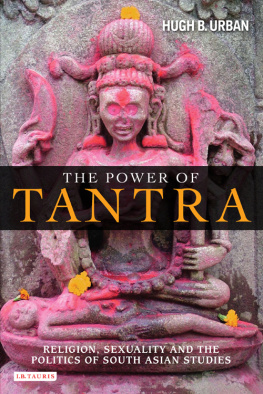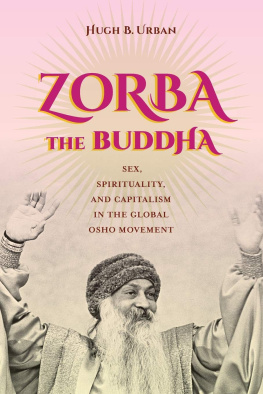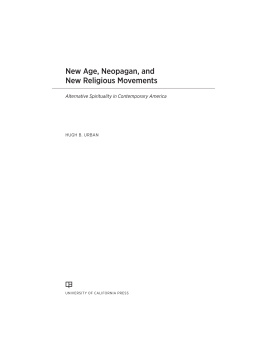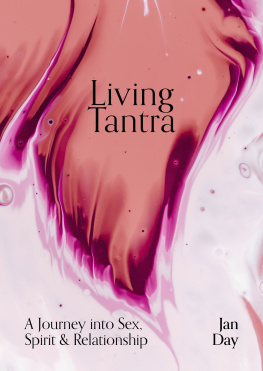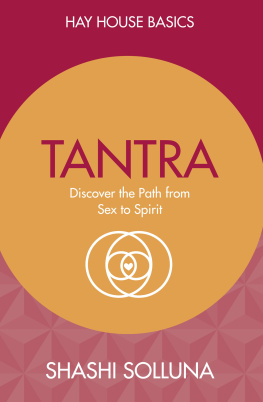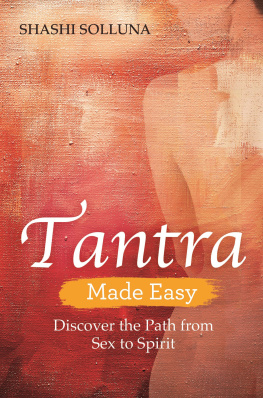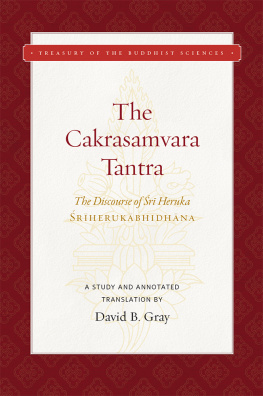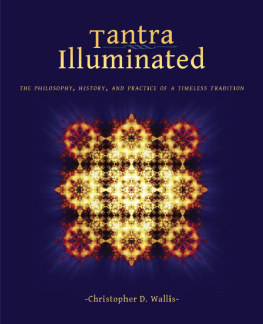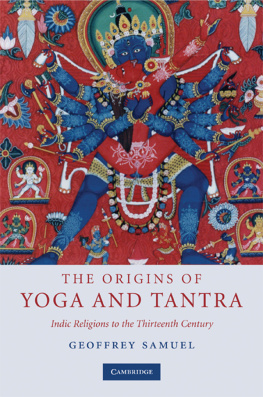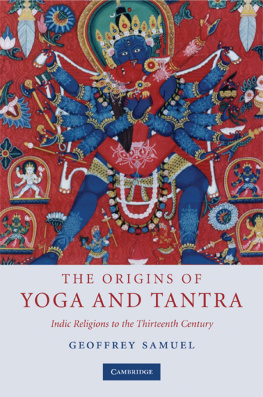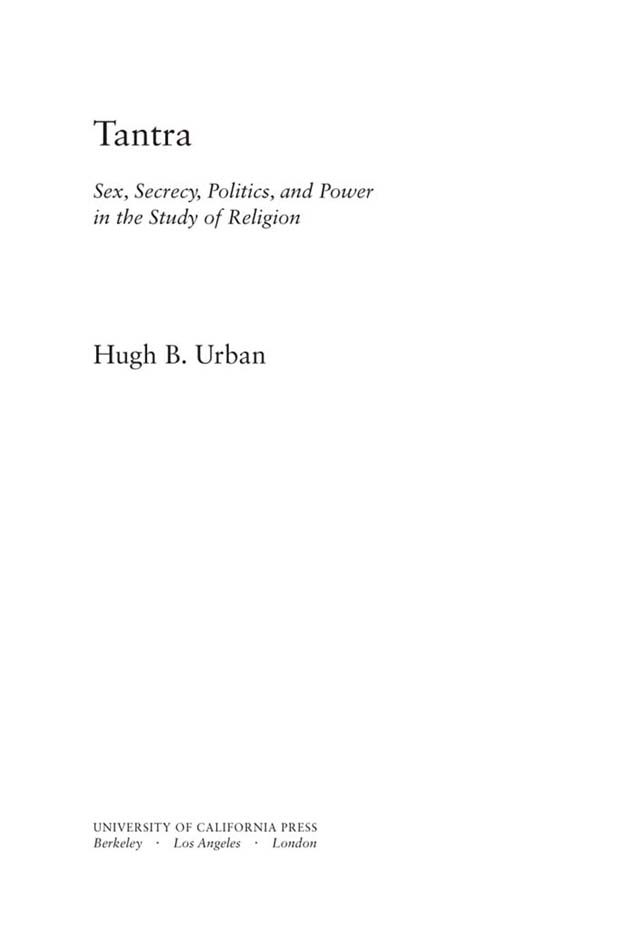Tantra
Tantra
Sex, Secrecy, Politics, and Power
in the Study of Religion
Hugh B. Urban
UNIVERSITY OF CALIFORNIA PRESS
Berkeley Los Angeles London
University of California Press
Berkeley and Los Angeles, California
University of California Press, Ltd.
London, England
2003 by the Regents of the University of California
Library of Congress Cataloging-in-Publication Data
Urban, Hugh B.
Tantra : sex, secrecy, politics, and power in the
study of religion / Hugh B. Urban.
p. cm.
Includes bibliographical references and index.
ISBN 0-520-23062-0 (alk. paper).
ISBN 0-520-23656-4 (pbk. : alk. paper)
1. Tantrism. 2. Tantric Buddhism. I. Title.
BL1283.84 u73 2003
294.5514dc21 2002073270
Manufactured in the United States of America
12 11 10 09 08 07 06 05 04 03
10 9 8 7 6 5 4 3 2 1
The paper used in this publication meets the minimum requirements of ANSI/NISO Z39.481992 (R 1997)
(Permanence of Paper).
In memory of Hugh Bayard Urban, Sr.
(19262001)
Contents
Illustrations
FIGURES
TABLES
Preface and Acknowledgments
The Extreme Orient and the Quest for Ecstasy
O Mother! At your holy lotus feet I pray that I have not transgressed all the Veda and Artha stras and destroyed your worship; with this fear, I have revealed many profound matters. Please forgive me for whatever sins I have incurred by revealing these secret things.... Forgive me, for, with an ignorant heart, I have revealed the most secret things of your tantras.
Knanda gamavgsa,
Bhat-Tantrasra (sixteenth century)
For the last 150 years... we have been orientalizing; in reality, it is precisely because the whole world is Westernizing that the West is becoming more permeable to Indian philosophy, to African art... to Arabic mysticism. Hindu philosophy, African art acquire a consciousness of self by virtue of those structures through which Western civilization assimilates them.
Michel Foucault, interview,
Who Are You, Professor Foucault? (1967)
This book was born in large part out of my own long and deeply ambivalent relationship to the phenomenon of Tantra or Tantrism and its role in the contemporary Western imagination.
In the course of my probing into the mysteries of Tantra, I interviewed, studied under, and became friends with a number of Tantric practitioners in West Bengal, Assam, Himachal, and Uttar Pradesh. Like many curious travelers, both Western and Indian, I was fascinated by the aura of secrecy, power, and danger that surrounds great Tantric centers, such as the cremation ground at Trpth, West Bengal, or the temple of Kmkhy in Assam, where rather grisly animal sacrifices are still performed on a regular basis. And I encountered a wide variety of responses and reactions to my curiosity. In Trph for example, I tried to question one skeptical and worldly older Aghor about the infamous fifth M of Tantric practicemaithuna, or sexual union with a female partner. After my repeated prodding, he finally lost his patience and exclaimed, All you Americans want to know about is sex. Dont you get enough of that in your own country? Go back home to your pornography and your free love. On the other hand, I also met a wide range of gurus who were quite proud of their powerful esoteric knowledge and seemed more than happy to advertise their secrets to a well-funded Western researcher. For many self-proclaimed tntrikas, the claim to possession of such knowledge appears to be closely related to their aspirations for status, prestige, money, and even a possible trip to the United States.
Troubled by these questions, I set out to try to unravel the complex genealogy of Tantra and our contemporary fascination with this most extreme of all Oriental traditions. It was an investigation that led me from ancient Sanskrit manuscripts in Calcutta and Kathmandu to the annals of British colonial rule, to the revolutionary writings of the Bengal nationalists, to the scandalous antics of contemporary New Age neo-Tantric gurus and the techno-Tantra of the World Wide Web. In the process, I found this genealogy to be far more complicated than I had ever imagined, and surely far more interesting than a simple imperialist imposition of a Western category onto a colonized subject. On the contrary, Tantra appears to me a densely tangled web of intersecting threads, both Eastern and Western, ancient and modern, woven through the intricate cross-cultural interplay of scholarly and popular imaginations, and creatively reimagined in each new historical era.
A brief note on transliteration: I have followed a Sanskritic model of transliteration for most of the South Asian terms in this text. There are, however, a few exceptions, particularly in the case of Indian authors whose names have been rendered by themselves or their disciples into English, often with little consistency. Names and titles that I have translated directly from Sanskrit or other languages will therefore be rendered with Sanskrit diacritics (e.g., Svm or r). But names and titles that have been published in English without diacritics will be left as printed (Swami, Svami, Shri, or Sri). All translations in this book are mine unless otherwise stated.
Because Tantra is such a lively and controversial topic, it was perhaps inevitable that new works would appear that I would be unable to incorporate into this book. At least three important studies were published during the very late stages of this books production, which I feel I should note but which I cannot discuss in any detail here. The first is David Gordon Whites The Kiss of the Yogin, an excellent study of the role of sexual rituals and sexual fluids in Tantric practice. The second is Ronald M. Davidsons Indian Esoteric Buddhism, an original and impressively thorough new look at the social context of early Buddhist Tantric movements in India. And the third is Martine van Woerkens The Strangled Traveler, arguably the best and most comprehensive study of the Thuggee myth and its role in the British colonial imagination. I regret being unable to discuss these important texts here, and I encourage interested readers to use them as a supplement to this book.
I am deeply indebted to the following people for their help in the research and writing of this book: first, the various gurus, sdhakas (practitioners), and devotees I have encountered in the course of my wanderings in the Orient; second, my various American gurus, most importantly, Wendy Doniger and Bruce Lincoln; third, my fellow sdhakas and sdhiks on the strange path of the Western study of Tantra, above all, Jeffrey J. Kripal, Rachel Fell McDermott, and Glen A. Hayes; fourth, the various scholars who have offered me feedback and criticism on this book in its various manifestations, including Andr Padoux (who kindly shared with me his own observations on the construction of Tantrism as a modern category), Narendra Nath Bhattacharyya (who kindly allowed me to interview him regarding his life, politics, and scholarship), Paul Muller-Ortega, and David Gordon White; and finally and perhaps most importantly, my personal bhairav-guru, Nancy, and the more fully enlightened members of our doga lineage, Shakti and Moses.
Abbreviations


